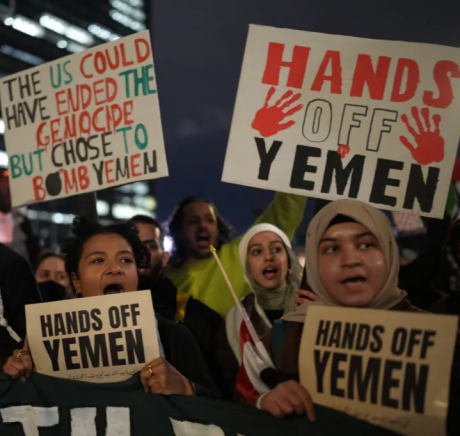Arts
You are here
A poem for every activity in life

June 25, 2025
“Taxi drivers recited poems to me during traffic. Newspapers displayed poems on the front page. Most villagers were illiterate, capable only of passing down stories through songs and oral poetry,” says Yemeni-American writer Threa Almontaser, author of award-winning poetry book The Wild Fox of Yemen published in 2021.
Almontaser calls The Wild Fox of Yemen “a love letter to Yemen”. The poems reel with clarity, longing, pain, wit, revolt, love of one’s people, and walking the diasporic tightrope of Yemen and the U.S. They are intimate and politically loaded. In “Dream Interpretation [Fox]” Almontaser writes:
Get myself a triple cheeseburger, bacon this time. Very American. Because that’s what I am now, right? (...) Most of my cousins are dying. The littlest leads me by the hand into a cave streaked with limestone, handprints, a swollen matriarchy. I find our famished ancestors cooking beside orange tatters. In their circle, a fox, her body ready for the fire.
Resistance to Western imperialism
The US started bombing Yemen in mid-March. By the end of the operation on May 6, U.S attacks across Yemen had killed well over 200 people, mainly civilians, and wounded 250 more.
The airstrikes on Yemen cost the U.S over one billion dollars. The Houthis, a rebel group that has controlled most of Yemen since 2014, began targeting Israel-bound ships in November 2023 to resist Israel’s U.S-backed genocidal violence in Gaza. They sank two vessels, seized one, and launched over 100 attacks on ships in the Red Sea bordering their coast.
Houthi leader Abdul Malik al-Houthi said: “We say to everyone in the world: there is no problem for you to traverse and pass through the Red Sea. The only targets exclusively are ships linked to Israel. The Israeli enemy, with American support, is committing genocide in Gaza, and this cannot be tolerated.”
The Houthis’ Red Sea resistance frazzled the U.S, threatening over one trillion dollars in annual merchandise. In a leaked Signal group chat, Trump administration officials discussed bombing Yemen to restore “freedom of navigation” and extract “economic gain” from the Red Sea.
Almontaser calls Yemen “a country that will fight back responsibly and still be bombed for it”, a country whose fight for liberating Palestine is indistinguishable from the fight to liberate itself.
As mainstream news on Yemen became clogged with American bombs and justifications for the bombs, Almontaser reflects on Yemeni resistance and ancient South Arabia.
Aden, a port city in modern-day Yemen, liberated itself from British colonial rule in 1967. The British occupied Aden in 1839 and asserted direct rule in 1937, stealing its oil, gas, and vibrant ports, one of the busiest in the world.
But Yemeni resistance fighters ousted the British in a concentrated four-year rebellion. They established the People’s Democratic Republic of Yemen in South Yemen, which lasted until South and North Yemen merged into modern-day Yemen in 1990. Almontaser shares that the Yemeni village of Yafa similarly defeated the British.
Islamophobia, poetry and resistance
In The Wild Fox of Yemen, Almontaser writes in the poem “Hunting Girliness”:
I quit being cautious in third grade
when the towers fell &, later, wore
the city’s hatred as hijab.
The poem is rooted in childhood memory. In post-9/11 New York, Almontaser’s home was arbitrarily raided at dawn by US officials. They busted down her house’s door and forced her family into vans. Her mother made calls, trying to “fight what happened”, but was met with “huge lists of other Arabs and Muslims” that the officials had also harassed. Her family was silenced; life in New York proceeded to bustle obliviously around them.
“My relationship with the hijab has always been a constant looking-over-my-shoulder when I stepped outside, and this past year only solidified that.”
She calls political poetry a way of “corralling people who have been broken on a spiritual level.” Yemeni poets are well-versed in this. Some consider writing the only survival strategy. Their words love, rage, mobilize, and rebuild.
In her poem “Recognized Language” she writes:
Where did my old words go, my first words? Sometimes I dream
in Arabic without understanding. I search everyone’s pockets,
leave them hanging like panting tongues. I try calling Arabic back
like wild horses (...) Tonight, I’ll light a fire to
eat the dark, make myself inviting so ghost tendrils of my
missing words float back to me,
get comfortable again on the
cushion of my tongue.
Almontaser believes that political poetry can “change the minds of the masses” into fighting for change. But collective action is necessary; the powerful are too deafened by greed to be swayed by poetry.
Section:









